Is TruthFinder legit? Digging into the background check service
TruthFinder is a legitimate background check service, but there's a lot more to the story. Learn whether TruthFinder is accurate and discover the potential privacy implications of people-search sites. Then, get a comprehensive device and identity theft protection service that can help you safeguard your personal information online.

Your personal information is likely stored in countless databases and public records — TruthFinder just makes it easier to look up.
Background check services like TruthFinder can be useful for people who want to learn more about others. In fact, a recent poll published by The New York Post showed that nearly 20% of single people run a background check on their dates. Because TruthFinder is accessible and easy to use, these numbers may continue to climb.
But is TruthFinder legit, reliable, and worth your time and money? Keep reading to find out what TruthFinder delivers and the broader implications for your digital privacy.
What is TruthFinder and how does it work?
TruthFinder is a subscription-based background check service that aggregates publicly-available information about individuals from various online sources. The service scrapes data from public records, social media platforms, and other databases to create comprehensive reports on people.
Users can search for information with a person's name, phone number, email address, or physical address, potentially accessing details like contact information, criminal records, property ownership, and even public social media profiles.
Here's how the TruthFinder process works:
1. TruthFinder asks for identifying information, like a name, location, age, and gender. It also asks optional questions about possible relatives and known locations to further refine the search.
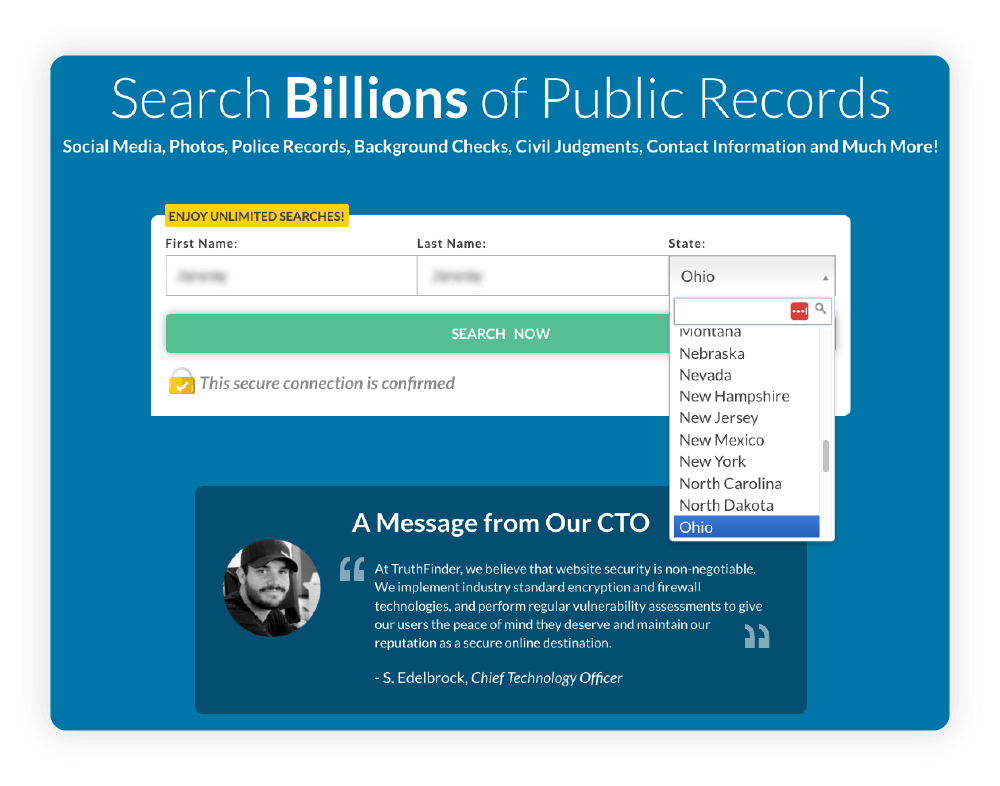

2. TruthFinder's algorithms scan public records, databases, and online sources to find publicly-available data on the person you’re searching for.
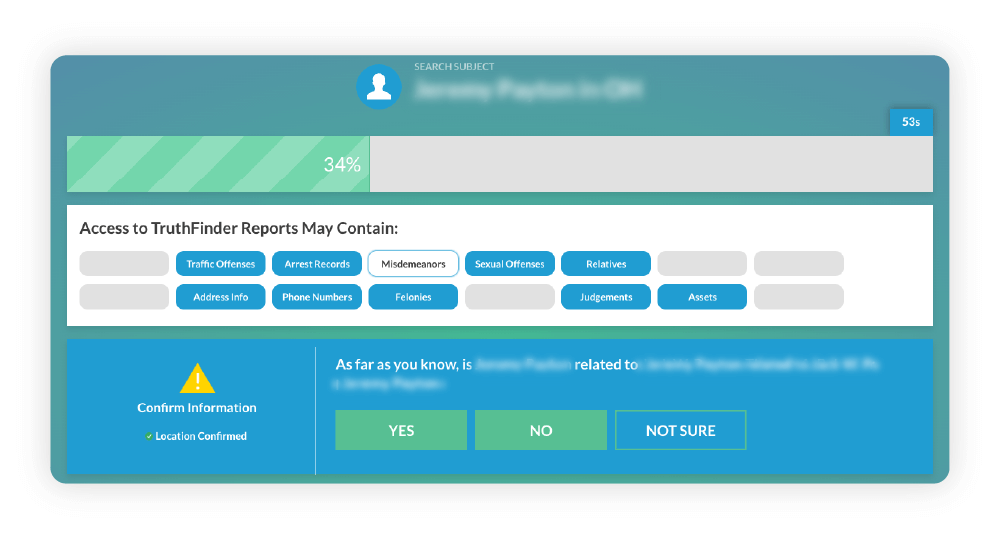

3. TruthFinder uses scare tactics and dark messaging during the report building process. When you run the search, the platform shows dramatic loading bars and warnings like, "Reports may contain graphic images," even if the report doesn’t include anything alarming.
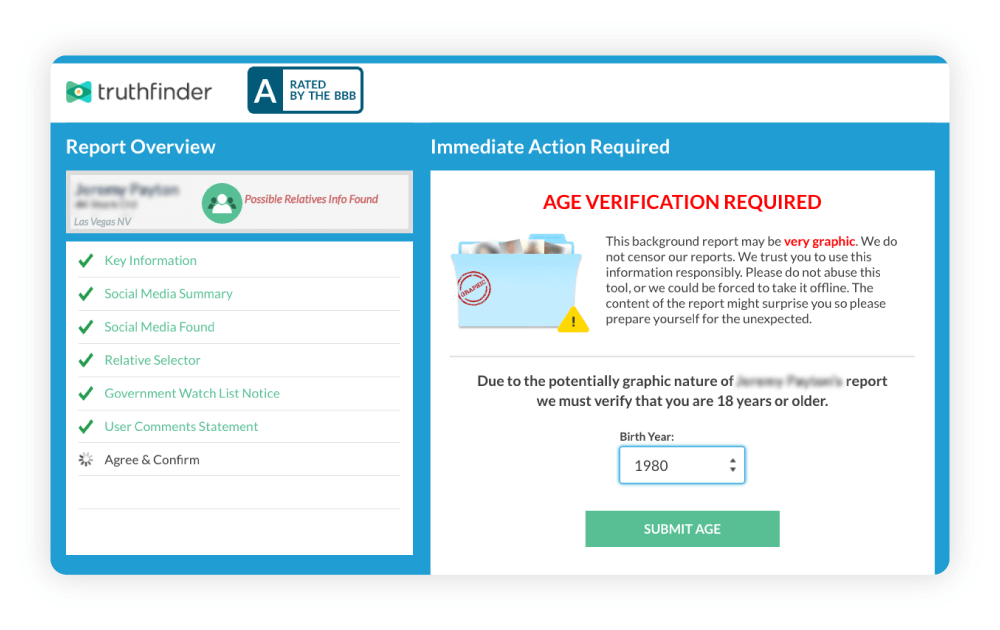

4. TruthFinder compiles the aggregated personal information into a report and presents the match to the user. It also asks for your email address, where the report will ultimately be sent if you pay for it.
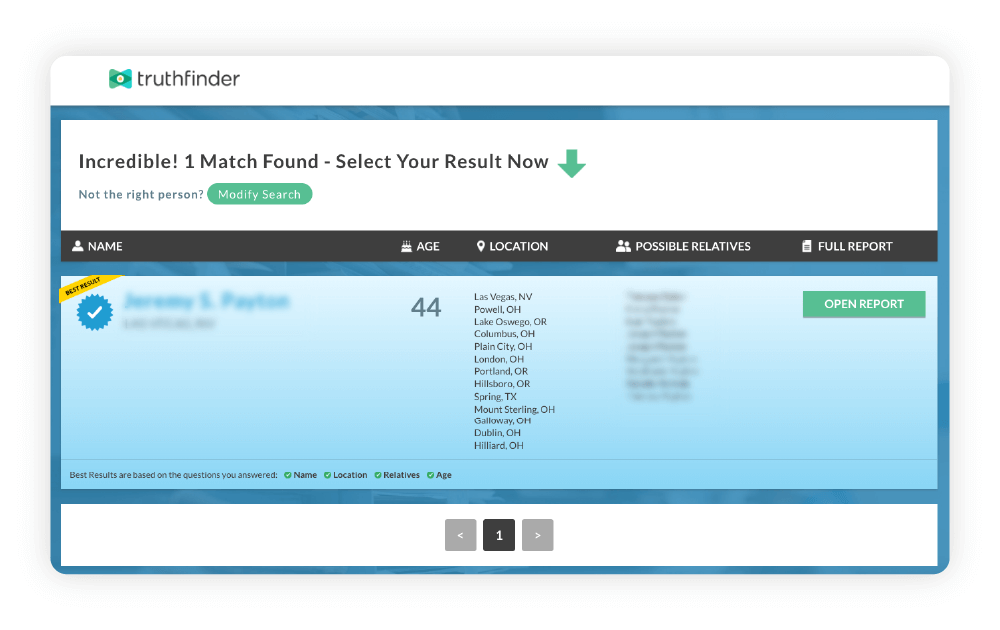

5. You’ll be prompted to agree to a disclaimer stating that the information cannot be used for purposes regulated by the Fair Credit Reporting Act (FCRA), such as screening job applicants or tenants. TruthFinder then presents the subscription options, requiring payment to access the full report.
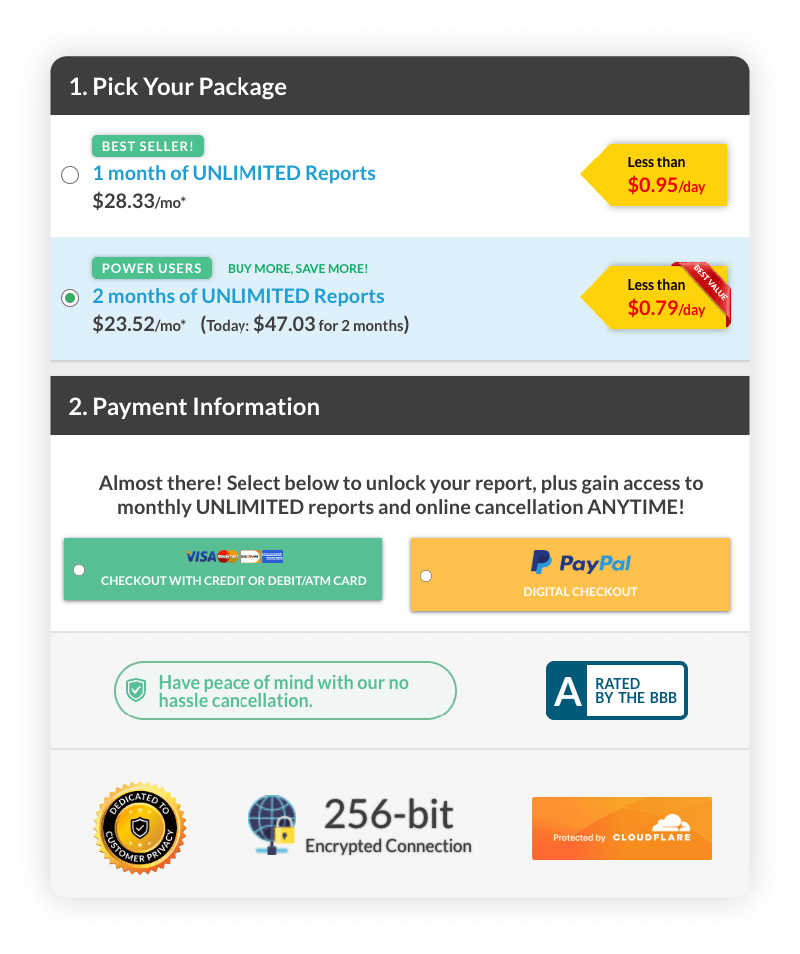

Because TruthFinder doesn't offer one-off report purchases, you need to sign up for a subscription plan to access any retrieved information. Subscriptions typically cost between $4.99 and $29.73 per month with automatic renewal, though occasional promotional offers may be available.
Does TruthFinder work well enough to justify its cost? The answer depends on what information you want and how current the public records are.
What information does TruthFinder provide?
TruthFinder provides users with a person’s publicly-available personally identifiable information, such as their full name, address history, marriage status, employment details, and property information. This data is compiled from public records, online sources, and other databases to offer a detailed background report.
Here’s a more comprehensive breakdown of everything a TruthFinder report may include:
- Full name and aliases
- Current and past phone numbers
- Present and past addresses
- Criminal records and arrest history
- Social media accounts
- Dating profiles
- Birth records
- Marriage and divorce information
- Employment and education history
- Possible relatives and associates
- Property records and asset information
- Professional licenses and permits
- Sex offender status
- Past and present vehicle ownership information
- Images (such as mugshots or publicly-available graphic images)
Keep in mind that this information is only as current and accurate as the public records TruthFinder accesses, which may be outdated or contain errors.
Is TruthFinder a legitimate business?
Yes, TruthFinder is a legitimate business that provides access to public records. The Better Business Bureau rates TruthFinder with an A and has accredited the business, meaning it meets standards for addressing consumer complaints in good faith.
However, in September 2023, the Federal Trade Commission took action against TruthFinder and its sister company, Instant Checkmate, alleging that these companies deceived users about the accuracy of their background reports and violated the Fair Credit Reporting Act.
According to the FTC complaint, TruthFinder misrepresented the comprehensiveness and accuracy of its reports, while failing to implement reasonable procedures to ensure maximum possible accuracy. This is a key requirement for services providing information that could affect consumers’ reputations.
TruthFinder cybersecurity and privacy concerns
While TruthFinder operates legally by compiling publicly available information, its service raises several cybersecurity and privacy issues that users should consider before searching or subscribing. Here are some of the key concerns:
Data accuracy and security risks
TruthFinder reports can contain outdated, incomplete, or inaccurate information that can lead to serious real-world consequences. This Reddit thread is full of stories from people listing issues like:
- Incorrect personal details: Users reported instances of wrong addresses, phone numbers, and email addresses.
- Misleading criminal records: Traffic tickets are sometimes listed as criminal offenses, meaning TruthFinder may not accurately reflect past criminal records.
- Outdated information: Critical information about search subjects, like their marital status or whether they’re deceased, may not be up to date.
- Inaccurate associations: "Possible associates" may include individuals completely unknown to the person being searched.
Another thing to consider: When you use TruthFinder, you’re not just accessing others’ information but also providing your own personal data and payment details to their systems. Their privacy policy indicates they collect extensive user data, including browsing behavior and search history, but it’s not clear how securely this sensitive information is stored and protected from potential data breaches.
Digital footprint exposure
Services like TruthFinder show just how far our digital footprints reach online. These platforms collect public information to build detailed profiles that bad actors can misuse. When personal details — like your address history, relatives’ names, or property records — are easy to find, you may be more vulnerable to social engineering scams and phishing attempts that can lead to identity theft.
Ethical implications and privacy invasion
Using background check services without someone’s knowledge or consent raises ethical concerns. Even if the information is publicly available, most people don’t expect their personal details to be collected, packaged, and sold.
When misused, these services can enable harmful behavior like cyberstalking or doxxing, putting vulnerable individuals at risk.
The widespread use of background searches without consent also blurs the line between public access and personal privacy. Scammers may use information from services like TruthFinder to create more convincing and targeted fraud attempts.
On the other hand, some argue that the paywall around these services acts as a form of gatekeeping. One Reddit user suggests that they’re glad TruthFinder info is behind a paywall, because if it weren’t, "everyone would look up info on everyone and it would lead to doxxing/other bad things.”
So, while TruthFinder’s scare tactics can feel scammy, the paywall may at least discourage casual snooping and limit how easily sensitive details can be accessed.
Opt-out processes
TruthFinder does offer an opt-out process for people who want their information removed from the service, but this process has limitations. It usually requires you to submit personal details — ironically, sharing even more data with the company you’re trying to limit.
And even if TruthFinder removes your profile, your information may still exist in other public databases and data broker sites, meaning your TruthFinder report will repopulate after a while.
To limit your exposure, you’ll need to actively opt out of multiple people search services and take broader steps to remove your personal information from the internet.
Norton 360 with LifeLock can help, with a Privacy Monitor feature that makes it easier to reduce your online exposure packaged alongside identity protection features like dark web monitoring, potential fraud alerts, and scam detection.
TruthFinder and the Fair Credit Reporting Act
TruthFinder clearly states that it is not a consumer reporting agency and its reports cannot legally be used for purposes covered by the FCRA. This means you should never use TruthFinder for employment, housing, credit, or insurance decisions.
The FTC’s action against TruthFinder highlights how serious this distinction is. Using its reports for FCRA-regulated purposes not only violates TruthFinder’s terms of service, but can also lead to major legal consequences, including lawsuits and regulatory fines.
For businesses that need to run background checks for hiring or tenant screening, relying on a non-FCRA-compliant service like TruthFinder poses a significant legal risk.
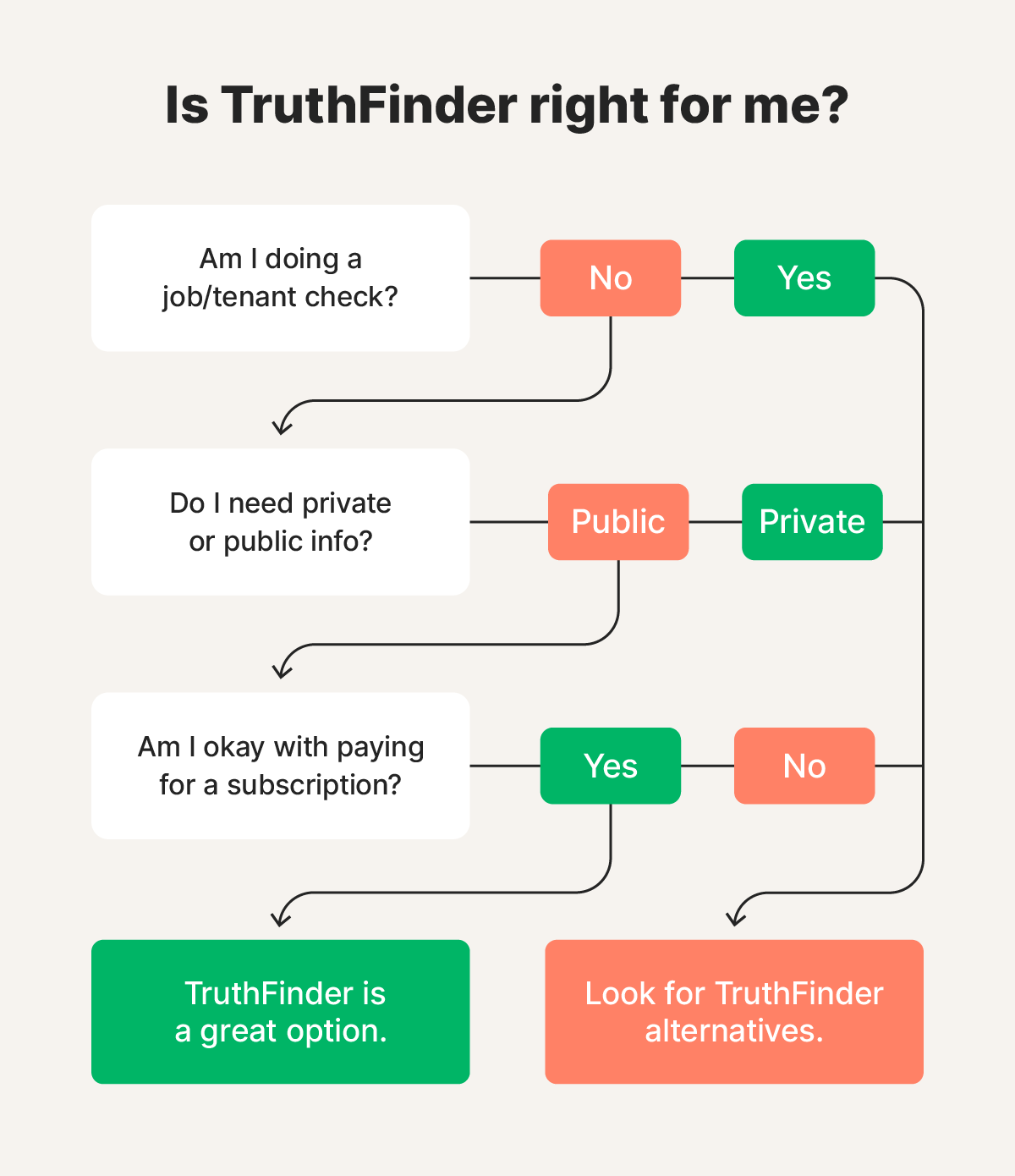

Legitimate alternatives to TruthFinder
For legitimate background screening needs, FCRA-compliant services may offer greater accuracy, legal protection, and ethical transparency. Unlike TruthFinder, these services are required by law to employ rigorous verification processes, maintain strict data update protocols, and only allow searches for permissible purposes.
Some popular FCRA-compliant alternatives to TruthFinder include:
- GoodHire, Sterling, and HireRight for employment screening
- TransUnion SmartMove for tenant screening
These services typically cost more than TruthFinder, but they should offer greater data accuracy and legal compliance. That makes them legitimate options that provide reliable information for informed decisions that impact someone’s job, housing, or financial future.
How to protect your information online
If you’re concerned about your exposure on platforms like TruthFinder, there are some steps you can take to help protect your personal information and regain control of your digital privacy. They largely require being proactive about what you share and how you secure your data.
Here are key actions that can help you stay safer online:
- Search for yourself regularly: See what personal information is publicly available online and take steps to remove anything sensitive.
- Use privacy-focused browsers: Options like Norton Private Browser or DuckDuckGo limit tracking and reduce data collection as you browse.
- Run a privacy audit: Use tools like Privacy Monitor, included in Norton 360 with LifeLock Select, to scan your online presence and help manage or remove exposed information across multiple platforms.
- Create strong, unique passwords: Secure all accounts with unique and complex passwords, use a password manager, and enable two-factor authentication wherever possible.
- Limit what you share on social media: Avoid posting personal info on socials, including your address, birthday, or travel plans, to reduce your susceptibility to data scraping.
- Use a VPN (Virtual Private Network): Encrypt your internet connection with a VPN and hide your IP address to better protect your browsing activity against trackers and hackers.
A cybersecurity-conscious perspective on TruthFinder
TruthFinder is a legitimate background check service but, as some users say, its reports can sometimes be outdated or incomplete. And while it may help you find certain information, it also raises serious concerns about privacy and data exposure.
Norton 360 with LifeLock Select helps you gain more control over your personal information exposure, with dark web monitoring, identity theft protection features, built-in scam detection, and more. Install it today and get alerted about known data breaches, or if your personal info is being used in potential fraud.
FAQs
Are people notified if you search them on TruthFinder?
No, TruthFinder does not notify individuals when someone searches for their information. TruthFinder conducts searches anonymously, which contributes to privacy concerns around the service.
Is TruthFinder a scam?
TruthFinder is not a scam. However, the FTC has taken action against the company for alleged deceptive practices regarding the accuracy and completeness of its reports.
How accurate is TruthFinder?
TruthFinder reports can be outdated, incomplete, or incorrect, sometimes showing traffic violations as criminal offenses or misidentifying possible associates. The platform also collects a broad range of user data, raising privacy concerns. In September 2023, the FTC claimed TruthFinder misled users about report accuracy and violated the Fair Credit Reporting Act.
How does TruthFinder affect your digital footprint?
TruthFinder itself doesn’t directly expand your digital footprint, but it does consolidate your existing digital information, making it more accessible. This increased visibility and accessibility of your personal information can make you more vulnerable to various internet scams and privacy invasions.
Is TruthFinder legal to use?
Yes, TruthFinder is legal to use for personal information purposes. However, using its reports for employment screening, tenant evaluation, credit decisions, or insurance eligibility violates the Fair Credit Reporting Act and can result in legal consequences.
Is TruthFinder free?
No, TruthFinder isn’t free. It requires a subscription that costs anywhere from $4.99 to $29.73 per month. While they occasionally offer promotional rates or limited trial periods, accessing complete reports always requires payment. The service’s pricing structure is one of the most common complaints in user reviews, particularly regarding the difficulty of cancellation and unexpected charges.
TruthFinder is owned and operated by Truth Finder LLC.
Editorial note: Our articles provide educational information for you. Our offerings may not cover or protect against every type of crime, fraud, or threat we write about. Our goal is to increase awareness about Cyber Safety. Please review complete Terms during enrollment or setup. Remember that no one can prevent all identity theft or cybercrime, and that LifeLock does not monitor all transactions at all businesses. The Norton and LifeLock brands are part of Gen Digital Inc.
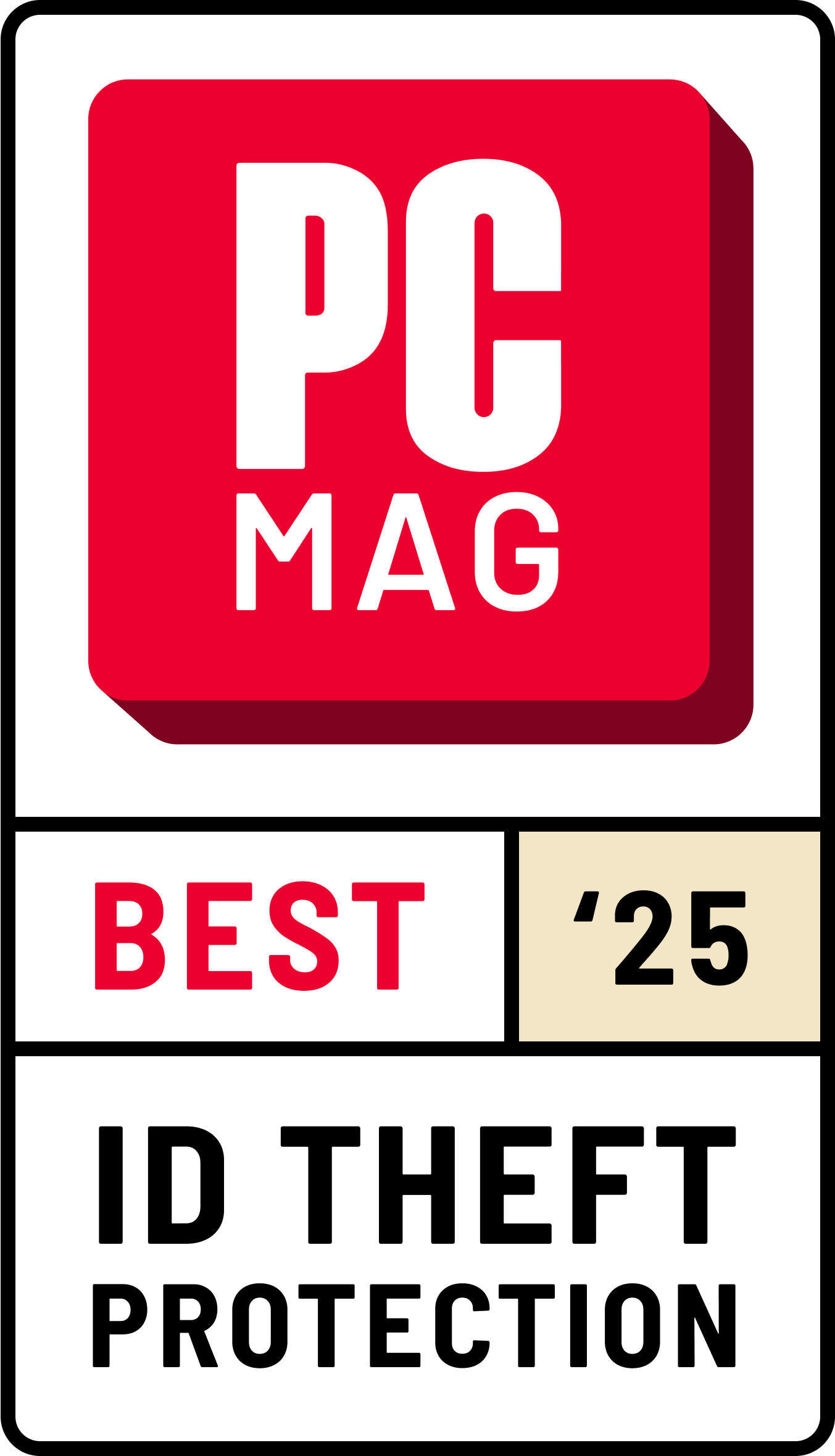








Want more?
Follow us for all the latest news, tips, and updates.